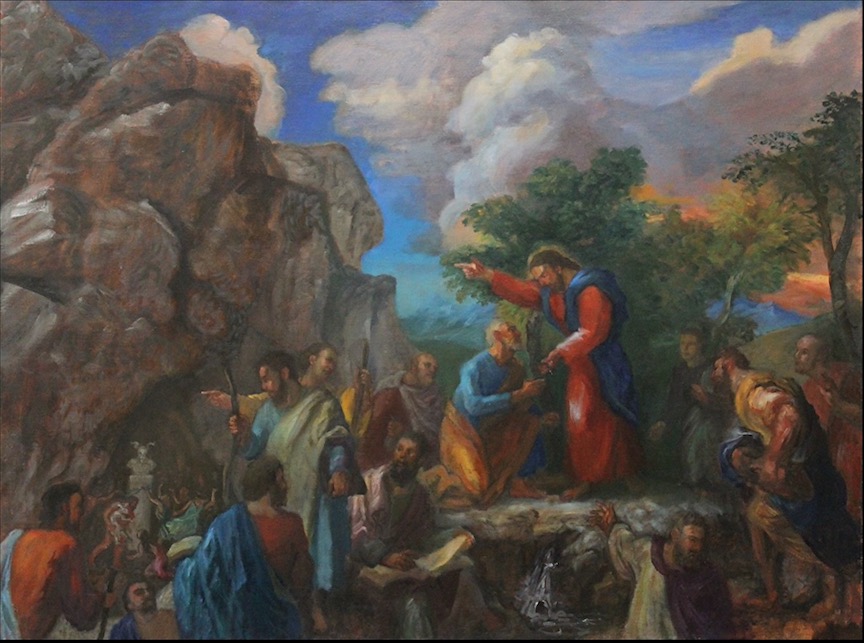Years ago, I gave a lecture at a university in which I argued that the chief crisis besetting modern people was the loss of the sense of their lives, including their intellectual lives, as a story. Without the capacity to narrate our lives as meaningful wholes, we cease to see order, purpose, and meaning in the particular chapters of our existence and in the overall form of those lives. If most people could only reintegrate their understanding of themselves as a story, if they could only reunite their acts of reasoning (logos) with the stories we tell ourselves about ourselves (mythos), our civilization would feel less hollow, our communal and cultural life less alienated, shallow, and lonely.
After the lecture, a young man approached me and asked whether I might not have things wrong. Perhaps all this talk of stories and purpose would be helpful, he said, but wouldn’t most of our problems be solved if we just had electric cars?
It was an odd moment.
I was reminded of that exchange, when I returned recently to Pope Benedict XVI’s encyclical, Spe Salvi. There, the late pope explores the question of the theological virtue of hope and does so in light of two modern distortions. First, he considers the way in which that virtue was internally misconstrued during the Protestant Reformation. Second, and at much greater length, he describes the way hope as a Christian virtue was displaced, externalized, and materialized through the emergence of modern faith in progress.
Benedict’s reflection on hope’s internal distortion during the Reformation constitutes the most profound observation in the letter. Speaking of faith and hope together, he quotes Saint Paul’s letter to the Hebrews, where we are taught that “faith is the substance of things hoped for; the proof of things not seen.” Martin Luther interpreted this passage in a purely “subjective sense, as an expression of an interior attitude,” by which he means “standing firm in what one hopes, being convinced of what one does not see.”
Such an interpretation is not “tenable,” writes Benedict. Faith and hope are indeed, in part, subjective dispositions of the Christian toward Christ and the future. But that is not all. Faith is substance as well, the presence in the soul by way of grace of what will be more fully realized in the coming of the Kingdom of God.
In this way, faith “draws the future into the present, so that it is no longer simply a ‘not yet.’” The “present is touched by the future reality.” So, faith is also an objective, substantial presence here and now of realities that will eventually be fulfilled, that is to say, made fully present. Hence, we do not rely wholly or even chiefly upon ourselves in the act of faith. We rather stand upon the sub-stance, the foundation, of God’s gift, which we trust only because it has already been made present to us. Our subjective act of faith is thus a response to the objective “substance” and “evidence” that God has first given us.

Note the union here of the internal and the external, the subjective and the objective, in Paul’s definition of faith and hope. That union is just what becomes distorted in the modern age, Benedict proceeds to argue. In the sixteenth century, the philosopher Francis Bacon looked upon the “recent spate of discoveries and inventions” and concluded that our hope was not to be found in any gift from God or to be placed in the coming of God’s kingdom. Our hope was rather to be placed in man’s inventiveness and his ability to realize the coming of “the kingdom of man.” Hope in God was replaced by hope in progress.
Benedict mentions briefly two of the chief advocates of this new ideology of progress: Immanuel Kant and Karl Marx. In one respect the two thinkers were absolutely opposed to one another.
Kant envisioned the coming of this kingdom as a shift from an ecclesial faith, where the individual’s faith is guided by the Church, to a “pure religious faith” that would be autonomous and interior to the individual. Progress would entail our realization as “subjects,” as free individuals.
Marx, in contrast, dreamed of a kingdom to redeem man “purely from the outside.” As a materialist, he believed it was possible to redeem man simply “by creating a favorable economic environment.”
What is remarkable about Benedict’s analysis is not its originality, but rather, that such a subtle and perceptive lamentation over modern life and the eclipse of hope in the Kingdom of God should be found in a magisterial document.
Modern persons follow Kant in being individualistic and concerned with the autonomy of their subjective interior life. They are, in brief, obsessed with the self. Absolute though the self becomes, modern persons place all their hope in the triumph of material progress. We value our spiritual selves absolutely but think only technological advances are of public concern, only material progress can redeem those selves from the curse of nature that is suffering and mortality.
Benedict argues, however, that material progress cannot solve an essentially spiritual problem. He shows us that the gifts of faith and hope are, in this respect, the antithesis of technology and the true alternative to it. They are objective realities, but spiritual rather than material, and so they are the true spiritual answers to the question posed by the existence of our spiritual selves.
They are not, however, indifferent to the material realm. For, as Benedict concludes, the final cause of our hope is eternal life; it is the “resurrection of the dead.” Faith in progress thus appears to be an immanent, distorted, and impossible substitute for the one true hope: eternal life of body and soul in the Kingdom of God.
Electric cars may (possibly) be nice to have, but the one thing all of us need is the gift of hope that God is always and already seeking to give to us.
__________















